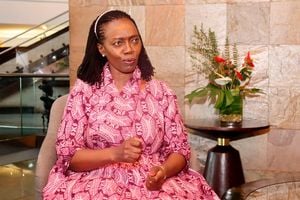Global civil society watchdog downgrades Kenya's civic space rating to 'repressive’

Mining and Blue Economy CS Hassan Joho recently warned Kenyans on social media who criticise President William Ruto and his government that they would be arrested.
What you need to know:
- Since the historic Gen-Z protests that began in mid-June against the Finance Bill's contentious tax provisions, internet activism is heavily monitored and social media activists face harassment, surveillance and abductions.
Two days after Mining and Blue Economy Cabinet Secretary Hassan Joho warned Kenyans on social media who criticise President William Ruto and his government that they would be arrested, a global civil society alliance has downgraded Kenya’s civic space to “repressed”.
According to the report, a “repressed” rating means civic space is significantly constrained.
There are 51 total “repressed” countries worldwide.
The latest scorecard on Kenya, according to the CIVICUS Monitor in its new global report, “People Power Under Attack 2024”, says Kenya’s civic space is significantly constrained.
The report further states that this year, Kenya's score dropped 13 points from 50 to 37, moving it from the middle tier “obstructed” to the second-worst tier “repressed”.
The report by the Johannesburg-based Global Alliance of Civil Society Organizations and Activists tracks the state of civic space in 198 countries and territories uses data from a variety of sources, including civil society organisations, research teams, human rights indices, and CIVICUS Monitor experts, to rate countries on a scale of open to closed.
Each country receives a rating between 0-100 based on its incidents, with higher scores indicating more open civic space.
This report comes at a time when active individuals and civil society members who criticise the government on social media say that after Mr Joho’s statement, they are likely to be targeted by the authorities through the use of excessive force, mass arrests, abductions, detention, more surveillance, harassment, intimidation, imprisonment, injury and death.
Since the historic Gen-Z protests that began in mid-June against the Finance Bill's contentious tax provisions, internet activism is heavily monitored and social media activists face harassment, surveillance and abductions.
According to the global report, at least 60 unarmed protesters have been killed and 1,200 protesters arrested while over 130 people are still missing, creating a chilling effect on civic freedoms in the country.
Months after the protests, enforced disappearances and abductions have persisted, highlighting a sustained effort to stifle dissent.
"Kenya stood at a crossroads as a country, and as a regional leader,” said Sylvia Mbataru, lead researcher on Africa at the CIVICUS Monitor.
“The road it could have taken was to lead by example and protect civil space. Instead, it pursued a path of repression, stifling expression and instilling fear in key segments of its population.”
The Kenya National Commission on Human Rights reported that at least 60 individuals had been killed and 71 cases of enforced or involuntary disappearances documented by the end of October. Government figures from September 2024 indicated the arrest of 1,208 protesters, with 132 individuals officially classified as missing.
However, civil society organisations contend that these numbers significantly underrepresented the scale of the violations.
“Evidence of extrajudicial killings has surfaced, with bodies of some missing individuals discovered in abandoned quarries, forests, rivers, and mortuaries, many bearing signs of torture, mutilation, and dismemberment,” stated the report.
“This pattern of state-sanctioned violence underscores an alarming erosion of civic freedoms and human rights in Kenya,” said Martin Mavenjina, Senior advisor at the Kenya Human Rights Commission. “This is a critical juncture for accountability and reform.”
"This alarming crackdown on peaceful protests and the targeted suppression of dissenting voices reflects a blatant disregard for human rights and the rule of law in Kenya”, said Estella Kabachwezi, Advocacy and Communications Manager at Defend Defenders.
“The use of excessive force, enforced disappearances, and extrajudicial killings cannot be ignored. The international community must hold the Kenyan government accountable and demand immediate action to protect civic freedoms and ensure justice for the victims," she added.





